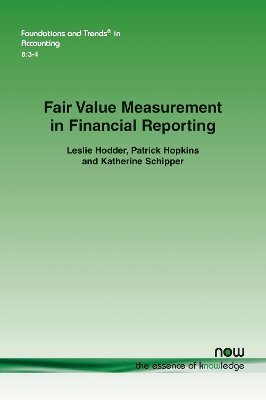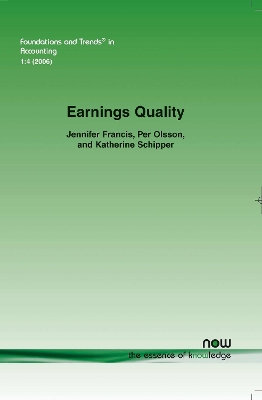Foundations and Trends (R) in Accounting
2 total works
Fair Value Measurement in Financial Reporting
by Leslie Hodder, Patrick Hopkins, and Katherine Schipper
Published 23 December 2014
The purpose of this monograph is to present practical and conceptual issues related to fair value Measurement in financial reporting and to evaluate certain research design aspects of empirical research that investigates the information properties of fair value Measurement, both in an absolute sense and in comparison to other Measurement bases. Although the primary focus is on fair value Measurement, the evaluation of existing research and suggestions for future research are germane to researchers interested in examining the information properties of any accounting Measurement basis. The 2008 financial crisis increased public scrutiny and brought accounting Measurement to the forefront of policy debate, including debate characterized by polarizing rhetoric.
Fair Value Measurement in Financial Reporting focuses the discussion on the design and execution of rigorous, inferentially valid empirical research that can inform this debate. The authors begin with a historical overview of the use of fair value Measurement based on the writings of prominent nineteenth and twentieth century accounting scholars. Except in the historical overview, the discussion is structured around the conceptual frameworks developed by the Financial Accounting Standards Board and International Accounting Standards Board. This has two advantages: (1) this structure helps to link research to the practical task of Setting accounting standards guided by the conceptual framework, and (2) it makes salient some of the difficulties encountered in the design and interpretation of research related to fair value Measurement. Following the introduction, section 2 describes the fair value Measurement attribute and distinguishes it from "fair value accounting". Section 3 discusses concepts related to the decision usefulness of financial statement elements Measured using the fair value attribute. Section 4 analyzes the enhancing qualitative characteristic verifiability in the context of accounting Measurement. Section 5 discusses the relation between fair value Measurement and macroeconomic effects. Finally, the authors discuss claims that use of the fair value Measurement attribute causes procyclical behavior among financial institutions and that accounting standards have become increasingly fair-value-oriented during the last two decades.
Fair Value Measurement in Financial Reporting focuses the discussion on the design and execution of rigorous, inferentially valid empirical research that can inform this debate. The authors begin with a historical overview of the use of fair value Measurement based on the writings of prominent nineteenth and twentieth century accounting scholars. Except in the historical overview, the discussion is structured around the conceptual frameworks developed by the Financial Accounting Standards Board and International Accounting Standards Board. This has two advantages: (1) this structure helps to link research to the practical task of Setting accounting standards guided by the conceptual framework, and (2) it makes salient some of the difficulties encountered in the design and interpretation of research related to fair value Measurement. Following the introduction, section 2 describes the fair value Measurement attribute and distinguishes it from "fair value accounting". Section 3 discusses concepts related to the decision usefulness of financial statement elements Measured using the fair value attribute. Section 4 analyzes the enhancing qualitative characteristic verifiability in the context of accounting Measurement. Section 5 discusses the relation between fair value Measurement and macroeconomic effects. Finally, the authors discuss claims that use of the fair value Measurement attribute causes procyclical behavior among financial institutions and that accounting standards have become increasingly fair-value-oriented during the last two decades.
Earnings Quality reviews current research activities around earnings quality. It provides an overview of alternative definitions and measures of earnings quality and a discussion of research design choices encountered in earnings quality research with a focus on capital markets. It examines how the precision of financial information affects the assessment and use of that information by capital market participants. The authors' main focus is on the precision of earnings, which is viewed as a summary indicator of the overall quality of financial reporting.
The authors review: earnings quality and place earnings quality in the context of overall capital market information quality; the determinants of earnings quality, broadly separated into intrinsic determinants that derive from business models and operating environments and reporting determinants that derive from the management's implementation decisions in financial reporting process; twelve measures of earnings quality providing examples of research using these measures, and offer views on which measures are preferable in a given context; research design issues and research findings pertaining to the capital market consequences of earnings quality, in particular its association with expected returns (or the cost of capital) and unexpected (abnormal) returns.
Earnings Quality is of interest to many participants in the financial reporting process including standard setters, preparers, auditors, regulators, analysts, and financial press commentators. It is of equal interest to accounting educators and researchers.
The authors review: earnings quality and place earnings quality in the context of overall capital market information quality; the determinants of earnings quality, broadly separated into intrinsic determinants that derive from business models and operating environments and reporting determinants that derive from the management's implementation decisions in financial reporting process; twelve measures of earnings quality providing examples of research using these measures, and offer views on which measures are preferable in a given context; research design issues and research findings pertaining to the capital market consequences of earnings quality, in particular its association with expected returns (or the cost of capital) and unexpected (abnormal) returns.
Earnings Quality is of interest to many participants in the financial reporting process including standard setters, preparers, auditors, regulators, analysts, and financial press commentators. It is of equal interest to accounting educators and researchers.

